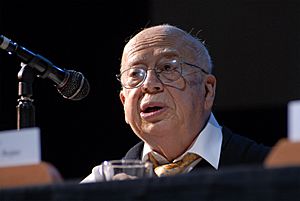Gonzalo Rojas facts for kids
Gonzalo Rojas Pizarro (born December 20, 1916 – died April 25, 2011) was an important Chilean poet. His writing style was part of the Latin American avant-garde movement. This means his work was new and experimental for its time. In 2003, he won the Cervantes Prize, which is a very important award for Spanish-language writers.
Contents
A Poet's Journey: Life and Career
Early Life and Education
Gonzalo Rojas was born in a port town called Lebu, Chile. He was the seventh child of a coal mining engineer. When he was young, he worked as an editor for a magazine called Antarctica in Santiago de Chile. He also taught at a university in Valparaíso.
Between 1938 and 1941, he was part of a group called Mandrágora. This was a surrealist group, which means they explored dreams and imagination in their art. Other famous writers like Braulio Arenas were also in this group. In 1948, his first book of poems was published in Santiago.
Gonzalo Rojas studied Law and Literature at the University of Chile. He taught at several small schools, including a German school. In 1947, he started teaching at the University of Chile in Valparaíso. He earned his degree in 1952 and became a professor at the University of Concepción.
Shaping Young Writers
During the late 1950s and early 1960s, Gonzalo Rojas led the Spanish Department. He also directed summer courses. He helped create workshops that supported new Chilean writers. He also invited writers from other countries to visit Chile and take part in these events.
Life in Exile
After a big political change in Chile in 1973, Gonzalo Rojas had to leave his home country. He was forced to live in exile, which means he could not return to Chile. He lost his job and was not allowed to teach at any Chilean university. The University of Rostock in East Germany offered him a place to teach.
He taught at universities in many different countries. These included Germany, the United States, Spain, and Mexico.
In 1979, Gonzalo Rojas received a special grant called a Guggenheim Fellowship. This allowed him to return to Chile. He settled in Chillán, a city about 400 kilometers south of the capital. Even though he was back in Chile, he still could not teach at a university there.
He lived in the United States again from 1980 to 1994. During this time, he was a visiting professor at Columbia University and the University of Chicago. Later, he became a professor at Brigham Young University.
Awards and Recognition
Gonzalo Rojas received many important awards for his poetry. In 1992, he won the Chilean National Prize for Literature. He also won the Queen Sofia Prize of Iberian American Poetry from the King of Spain.
He also received the Octavio Paz prize from Mexico and the José Hernández prize from Argentina. In 2004, he was given the Cervantes Prize for his work in 2003. This is one of the highest honors for writers in the Spanish language.
Final Years
Gonzalo Rojas passed away on April 25, 2011, after a stroke he had in February. The government of Chile announced two days of official mourning for him. He was buried in Chillan, Chile. Many people consider him one of the greatest modern poets from Chile, along with Nicanor Parra.
His poems have been translated into many languages. These include English, German, French, Portuguese, Russian, Italian, and Japanese.
Selected Works
Here are some of Gonzalo Rojas's important poetry collections:
- La miseria del hombre (1948)
- Contra la muerte (1964)
- Oscuro (1977)
- Transtierro (1979)
- Del relámpago (1981)
- 50 poemas (1982)
- El alumbrado (1986)
- Antología personal (1988)
- Materia de testamento (1988)
- Antología de aire (1991)
- Desocupado lector (1990)
- Las hermosas (1991)
- Zumbido (1991)
- Río turbio (1996)
- América es la casa y otros poemas (1998)
- Obra selecta (1999)
See also
 In Spanish: Gonzalo Rojas para niños
In Spanish: Gonzalo Rojas para niños
 | Jewel Prestage |
 | Ella Baker |
 | Fannie Lou Hamer |


